News
Antique Flat Cap Pruner Knives: A Legacy of Craftsmanship from Sheffield
Posted On: 15 Oct 2024 by Toby HallToday, Sheffield-made antique pruner knives are popular among collectors, historians, and gardening enthusiasts. Many of these knives are not only well-preserved but also still functional, a testament to the skill and craftsmanship of Sheffield’s cutlers. Collectors often look for pruner knives with clear maker’s marks—like those of Saynor or Lockwood Brothers—as these not only add to the knife’s value but also serve as a historical record of the golden age of Sheffield cutlery.

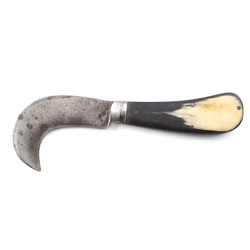
Antique Flat Cap Pruner Knives: A Legacy of Craftsmanship from Sheffield
Pruner knives, specifically antique flat cap pruner knives, are more than just a practical tool for horticulturists and gardeners. These specialized knives, which were integral to pruning and grafting work in orchards and vineyards, also represent a rich heritage of craftsmanship. Now sought after by collectors and enthusiasts alike, the finest examples of these pruner knives originated in Sheffield, England—a city globally renowned for its cutlery and steelwork.
The quality of Sheffield pruner knives is often associated with historic makers such as Saynor, Cooke & Ridal, and Lockwood Brothers. These manufacturers were known for their exceptional attention to detail, the use of high-quality materials, and their ability to create tools that stood the test of time.
Sheffield’s Reputation for Quality
Sheffield's history as a center for metalwork stretches back centuries, particularly in the cutlery trade. The city's access to high-quality iron, charcoal, and abundant water for forging made it an ideal place for steelwork and tool production from the medieval period onwards. By the 19th century, Sheffield had become synonymous with premium steel products, including knives, scissors, and tools of all types. The term “Sheffield steel” became a mark of quality.
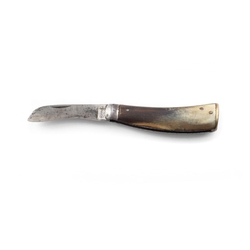
Horn Handle Flat Cap Pruner or Pruning Pocket Knife, Sheffield Made, c1900, value circa £150-£200.
Sheffield’s dominance in the cutlery and tool industry was due in large part to its adoption of crucible steelmaking, which allowed for the production of durable, high-carbon steel. This advancement gave Sheffield-made blades a sharpness and toughness that made them a global standard.
Among the tools produced, pruner knives were highly regarded by professionals and gardeners alike. The flat cap pruner knife, with its distinctive folding design and rounded or flat cap on the handle’s end, became a staple in horticultural work.
Saynor: A Legacy of Precision
Saynor, one of the most famous Sheffield cutlers, stands out for its impeccable craftsmanship. Officially operating under the name Saynor, Cooke & Ridal, this company began producing high-quality pruner knives in the late 19th and early 20th centuries. Their products were not only used locally but also exported worldwide due to their reliability and superior cutting edges.
Saynor pruner knives are typically recognized by their sturdy, well-balanced construction, with high-carbon steel blades that maintained their sharpness even after rigorous use. The folding design of many Saynor pruner knives made them convenient for gardeners, who could easily stow the tool in a pocket after use. The flat cap handle, often made of wood or horn, provided a comfortable grip and an ergonomic design, making it easier to apply force while cutting through tough branches.
Saynor’s reputation has endured because of the company's dedication to quality. Even today, antique Saynor pruner knives are prized for their resilience, still often as sharp and usable as when they were made over a century ago. Collectors value their sturdy construction and historical significance, while gardeners appreciate their practicality and lasting sharpness.
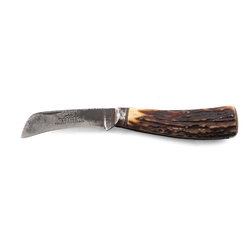
c19th Victorian Thomas Turner Encore Sheffield Flat Cap Pocket Knife Pruner with Stag Antler Bone Handles c1890
Lockwood Brothers: Durability and Tradition
Another important name in the world of Sheffield pruner knives is Lockwood Brothers. Operating from the mid-19th century until the early 20th century, Lockwood Brothers became synonymous with the production of reliable tools and knives, including the flat cap pruner knife.
Lockwood Brothers pruners are distinguished by their robust build and traditional designs. Like other Sheffield makers, the company used high-carbon steel for their blades, ensuring durability and the ability to hold a keen edge. The handles were often made from high-quality materials like hardwood or bone, giving the knives an appealing aesthetic as well as a functional grip.
Lockwood Brothers pruners are also known for their attention to detail in the hinge and spring mechanisms, essential features in folding knives. These mechanisms ensured smooth operation and longevity, even after years of repeated opening and closing. Their knives were made to last and to perform in even the harshest conditions, which is why they are still found in working condition today.
The Flat Cap Pruner Knife Design
What makes the flat cap pruner knife design so iconic is its simplicity and functionality. The blade, usually curved, is ideal for pruning tasks, allowing for a clean and precise cut with minimal effort. This shape is particularly suited for removing small branches or stems with accuracy, essential for maintaining the health of a plant.
The “flat cap” feature refers to the rounded or flat end of the handle, often designed to give the user more control and leverage during use. The flat cap was also a design choice meant to protect the user’s hand from injury during repetitive tasks, allowing them to apply force without discomfort.
Unlike modern pruners, which are often bulkier or mechanized, antique flat cap pruner knives were lightweight and easily portable, making them perfect for professional gardeners who needed tools that were not only effective but also easy to carry. This portability, combined with the craftsmanship of companies like Saynor and Lockwood Brothers, made Sheffield pruners highly coveted across the world.
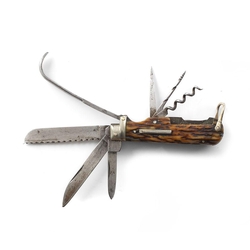
A Good Late c19th Horseman's or Coachman's Sheffield Made Folding Pocket Knife with Stag Antler Bone Handles
Collecting Antique Sheffield Pruner Knives
Today, Sheffield-made antique pruner knives are popular among collectors, historians, and gardening enthusiasts. Many of these knives are not only well-preserved but also still functional, a testament to the skill and craftsmanship of Sheffield’s cutlers. Collectors often look for pruner knives with clear maker’s marks—like those of Saynor or Lockwood Brothers—as these not only add to the knife’s value but also serve as a historical record of the golden age of Sheffield cutlery.
Condition, materials, and age play significant roles in the valuation of antique pruner knives. Those made from horn or bone handles tend to be more highly prized, and the patina on both the blade and the handle adds character and authenticity to the piece.
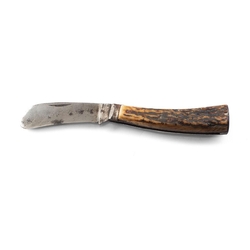
Late c19th Victorian Flat Cap Pocket Pruner or Pruning Knife with Stag Antler Bone Handles, Sheffield Made c1890
Conclusion
Antique flat cap pruner knives from Sheffield, particularly those made by renowned makers like Saynor and Lockwood Brothers, represent a rich tradition of British craftsmanship. These knives, once essential tools for gardeners, now serve as cherished collectibles that embody the skill, innovation, and quality of Sheffield’s cutlery industry. Their legacy endures in the hands of collectors and gardeners who continue to admire and use these historic tools.
The unmatched quality of Sheffield steel and the attention to detail that went into these pruner knives ensures their place in both gardening history and the world of antique collectibles.
If you have antique or vintage pocket knives that you may be interested in selling, please do contact us by calling us on 01785 561799, by Whatsapp to 07376 039387 or email us at info@leightonhallauctions.com.
